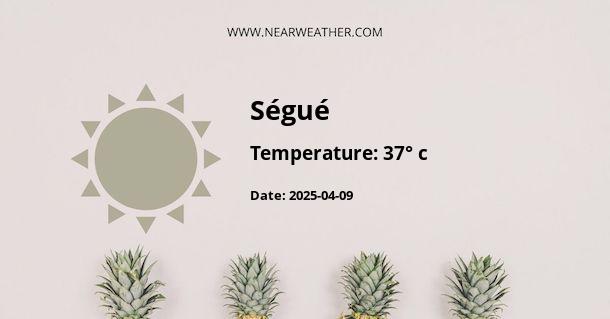Ségué, Mali: Climate and Weather Year Round
Ségué, located in Mali, experiences a semi-arid climate characterized by hot and dry weather for most of the year. The region is influenced by its proximity to the Sahara Desert, resulting in high temperatures and low precipitation levels. Understanding the climate and weather patterns in Ségué is essential for residents and visitors alike. In this article, we will explore the climate and weather conditions in Ségué throughout the year.
Temperature
Ségué has a hot desert climate, with temperatures often reaching extreme levels. The hottest months are typically April to June, with average highs ranging from 36°C (97°F) to 40°C (104°F). During these months, it is important to take necessary precautions to stay cool and hydrated.
In contrast, the coolest months are December and January, with average highs ranging from 24°C (75°F) to 27°C (81°F). However, even during the cooler months, temperatures can drop significantly during the night, so it is advisable to pack warm clothing, especially if you plan to be outdoors in the evening.
It is worth noting that the temperature in Ségué can vary significantly between day and night. The diurnal temperature range can be as high as 20°C (36°F), so it is essential to dress in layers to accommodate these fluctuations.
Precipitation
Ségué experiences a very dry climate, with low annual precipitation levels. The rainy season typically occurs from June to September, with August being the wettest month. During this period, the region receives most of its annual rainfall, although the amounts are still relatively low compared to other regions.
On average, Ségué receives around 300-400 millimeters (12-16 inches) of rainfall annually. The rain showers are usually short-lived but can be intense, contributing to the rapid runoff and limited water absorption in the arid soil. It is important to note that even during the rainy season, precipitation may not occur consistently, and there may be periods of drought.
Wind and Dust Storms
Due to its proximity to the Sahara Desert, Ségué is susceptible to wind and dust storms, especially during the dry season. These storms, known as harmattan, can bring strong winds and large amounts of dust and sand, significantly reducing visibility and creating challenging conditions for outdoor activities.
The harmattan winds usually occur between November and February, and it is advisable to take precautions during this period. Protecting your eyes, covering your nose and mouth, and securing loose objects are essential to minimize the impact of these storms.
Climate Change and Future Projections
Like many other parts of the world, Ségué is also experiencing the impacts of climate change. Rising temperatures, changing rainfall patterns, and increased frequency of extreme weather events are some of the observed changes in the region.
According to climate models, it is projected that Ségué will continue to experience warmer temperatures in the future. This can have significant implications for agriculture, water resources, and overall ecosystem health. It is crucial for local communities and policymakers to adapt and implement strategies to mitigate the effects of climate change.
Conclusion
Ségué, Mali, has a hot and dry climate with extreme temperatures and low precipitation levels. Understanding the weather patterns throughout the year is essential for residents and visitors to prepare accordingly. With the increasing impacts of climate change, it is crucial to prioritize sustainable practices and adapt to the changing environment. By understanding the climate and its future projections, efforts can be made to minimize the impact and ensure the well-being of the region.
A - Ségué's Latitude is 14.502940 & Longitude is -11.407530.
A - Weather in Ségué is 37° today.
A - Climate Conditions in Ségué shows clear sky today.
A - Humidity in Ségué is 10% today.
A - Wind speed in Ségué is 6.3 km/h, flowing at 62° wind direction. today.
